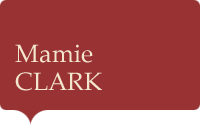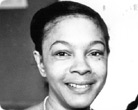Psychologist and activist Mamie Phipps Clark conducted groundbreaking studies on race and child development that helped end segregation in the United States. She also founded the Northside Center for Child Development in Harlem, which has eased that community through social, educational, and psychological changes for half a century.
Clark was born in 1917, in Hot Springs, Arkansas. Though she grew up attending segregated schools in a highly segregated town, her father's privileged position as a physician earned the family more respectful treatment. She entered Howard University in 1934, where she pursued psychology and graduated in 1938 magna cum laude. During her senior year, she married Kenneth Clark, who received his master's degree in psychology at Howard.
Her master's dissertation, "The Development of Consciousness of Self in Negro Pre-School Children," grew from her work with black children in segregated public nursery schools, where she conducted psychology tests using dolls. She and Kenneth Clark developed these studies further in a fellowship proposal that enabled Mamie to continue her work at Columbia University. In 1943, she became the first African American woman to earn a Ph.D. in psychology from that institution.
Mamie and Kenneth Clark's research on children and race showed that black children became aware of their racial identity—and of society's negative view of blackness—at about 3 years old. The Clarks presented their results at several school desegregation trials and their work, along with other research on the effects of segregation on self-esteem, formed a moral foundation for the NAACP's case in Brown v. Board of Education, which overturned racial segregation in public schools in 1954.
After several dissatisfying years working in public and private social services, Mamie Clark founded the Northside Center for Child Development in 1946, the first center to provide therapy for children in Harlem. At a time when public schools were forcibly and illegally enrolling many black children into programs for the mentally handicapped, the center conducted its own intelligence tests, fought the schools, and empowered the local population. Realizing that therapy alone could not address the detrimental affects of racism on the community, Northside also assisted families with their housing and financial difficulties.
In addition to directing the Northside Center for more than thirty years, Clark served on the boards of organizations such as the American Broadcast Company, Mount Sinai Medical Center, the Museum of Modern Art, and the New York Public Library. She retired from Northside in 1980 and died of cancer three years later. She is survived by two children, Kate and Hilton, both born during the years their mother earned her Ph.D.















